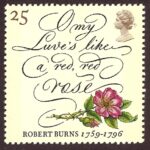![[Summer Sun]](https://riverhouses.org/wp-content/uploads/2024/06/fun-face-emoji-150x150.png) The weather is warming up, the flowers are blooming, the birds are laying their eggs, and the trees are all leafed-out — summer is on its way! Our homeschool poem-of-the-week for the first week of June and the first week of Hercules Term, our summer term in the River Houses, is one of the oldest songs in the English language. Its author is unknown, but it was probably written sometime in the 1200s and it is in the Wessex dialect of Middle English — loudly sing, cuckoo!
The weather is warming up, the flowers are blooming, the birds are laying their eggs, and the trees are all leafed-out — summer is on its way! Our homeschool poem-of-the-week for the first week of June and the first week of Hercules Term, our summer term in the River Houses, is one of the oldest songs in the English language. Its author is unknown, but it was probably written sometime in the 1200s and it is in the Wessex dialect of Middle English — loudly sing, cuckoo!
Sumer is i-cumin in
Sing, cuccu, nu. Sing, cuccu.
Sing, cuccu. Sing, cuccu, nu.Sumer is i-cumin in —
Lhude sing, cuccu!
Groweth sed and bloweth med
And springth the wude nu.
Sing, cuccu!Awe bleteth after lomb,
Lhouth after calve cu,
Bulluc sterteth, bucke verteth —
Murie sing, cuccu!Cuccu, cuccu,
Wel singes thu, cuccu.
Ne swik thu naver nu!
“Sumer is i-cumin in” is a round, like “Row, row, row your boat,” intended to be sung by multiple voices in turn, but it is often printed as a simple poem and can easily be read as such. Here’s a modern English translation:
Sing, cuckoo, now. Sing, cuckoo.
Sing, cuckoo. Sing, cuckoo, now.Summer has arrived,
Loudly sing, cuckoo!
The seed is growing and the meadow is blooming,
And the wood is coming into leaf now,
Sing, cuckoo!The ewe is bleating after her lamb,
The cow is lowing after her calf;
The bullock is prancing, the stag cavorting,*
Sing merrily, cuckoo!Cuckoo, cuckoo,
You sing well, cuckoo.
Never stop now!
*Nota bene: You may wish, or perhaps you may not wish, to delight your local ten-year-old by explaining that the translation of the phrase “bucke verteth” is disputed. Some profound scholars believe it actually contains the first English appearance of the verb “to fart,” and they would translate this phrase as “billy-goat farteth.” Other learned philologists are content to read “bucke verteth” as “buck cavorteth,” or more naturally, “the stag leaps about.” 🦌
Here’s how you can present “Sumer is i-cumin in” this week in your homeschool: just go about your usual school activities singing the opening lines all day — “Sumer is i-cumin in, sing, cuccu!” Your students will pick it right up and make it a June tradition:
(That’s the European Cuckoo shown, correctly, in the video — a species that really does sing “cuccu,” unlike our North American cuckoos.)
“Sumer is i-cumin in” has been a staple of high school and college English classes for generations. By sharing it with your students this summer you’ll be introducing them to another piece of the rich and ancient heritage of the English language.
What wonderful words and poetical productions will you and your students be studying in your homeschool this Hercules Term? 😊
❡ Sing, cuccu! If a special line or turn of phrase happens to strike you in one of our weekly poems, just copy it onto your homeschool bulletin board for a few days and invite your students to speak it (or sing it!) aloud — that’s all it takes to begin a new poetical friendship and learn a few lovely words that will stay with you for life. 🌞
❡ Explore more: For a quick review of the European Middle Ages, the era within which this little song originated, turn to page 188 in your River Houses history encyclopedia. 📚
❡ Here, said the year: This post is one of our regular homeschool poems-of-the-week. Print your own River Houses Poetry Calendar to follow along with us as we visit fifty of our favorite friends over the course of the year, and add your name to our River Houses mailing list to get posts like these delivered right to your mailbox every week. 📫
❡ Homeschool calendars: We have a whole collection of free, printable, educational homeschool calendars and planners available on our main River Houses calendar page. They will help you create a light and easy structure for your homeschool year. Give them a try today! 🗓
❡ Support our work: If you enjoy our educational materials, please support us by starting your regular Amazon shopping from our very own homeschool teaching supplies page. When you click through from our page, any purchase you make earns us a small commission at no extra cost to you. Thank you for helping us to keep going and growing! 🛒
❡ Join us! The aim of the River Houses project is to create a network of friendly local homeschool support groups — local chapters that we call “Houses.” Our first at-large chapter, Headwaters House, is now forming and is open to homeschoolers everywhere. Find out how to become one of our founding members on the Headwaters House membership page. 🏡




